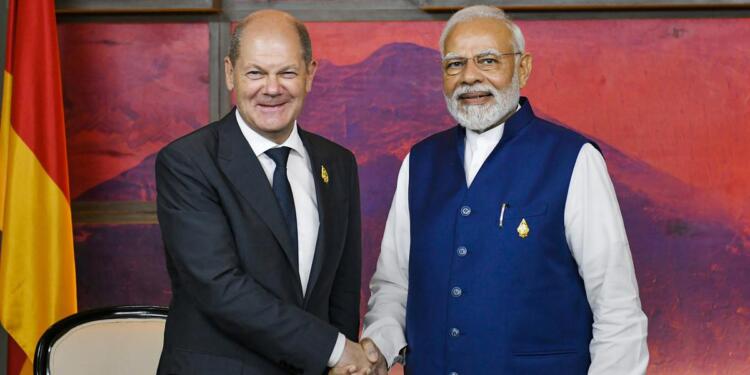German Chancellor Olaf Scholz, arrived in New Delhi on Thursday for a three-day visit. The leader met Prime Minister Narendra Modi on Friday to discuss a wide-range of topics in a number of areas. The visit comes as Germany is looking to India in its attempts to diversify trade partners and decrease its dependency on China.
The German government has been trying to persuade companies to ease their reliance on trade with China and reports have indicated that many involved individuals have suggested India, as a potential alternative. Germany is already India’s largest trading partner in Europe and the seventh-largest worldwide. Bilateral trade was $22 billion in 2020-21, according to the Indian government.
According to Volker Treier, head of foreign trade at the German Chamber of Commerce DIHK, German direct investments in India have been valued at around 25 billion euros for 2022 – about 20 percent of the volume invested in China. He believes that share could rise to 40 percent by the end of the decade. “China will not disappear, but India will become more important for German companies. India is the litmus test, so to speak. If de-risking China is to work, India is the key, because of the size of the market and the economic dynamism in the country,” he added.
On his visit, Olaf Scholz is likely to seek help in navigating the obstacles that small and medium-sized German firms face when doing business in India. More than 60% of German businesses cited bureaucratic hurdles – such as protectionist measures and procurement rules – as the biggest drawback to operating in the country, according to a survey from the Indo-German Chamber of Comm
Meanwhile, India is planning to order six new submarines as part of its strategy to counter China’s expanding naval presence in the Indo-Pacific region and Germany’s Thyssenkrupp AG is bidding for the 400 billion rupee ($4.8 billion) order.
Speaking at the 18th Asia-Pacific Conference of German Business 2024, with Olaf Scholz present, PM Modi said “We have made a roadmap of Viksit Bharat in the coming 25 years. I am happy that in this important time, the German cabinet has released the ‘Focus on India’ document. Germany has decided to increase the visa number for the skilled Indian workforce from 20,000 to 90,000. It will give a new pace to Germany’s growth.”
Scholz also expressed a strong commitment to deepening defence and economic partnerships with India. This aligns with earlier reports that speculate a shift in Germany’s foreign policy which includes reducing its dependence on China and forming closer ties with New Delhi.
German Chancellor Olaf Scholz on Friday expressed Germany’s interest in accelerating negotiations for a comprehensive free trade agreement (FTA) between India and the European Union (EU). He voiced optimism about concluding the deal “in months rather than years.” Talks, which resumed in June 2022 after a nearly decade-long hiatus, have faced a number of obstacles in the past, primarily from the EU.


























